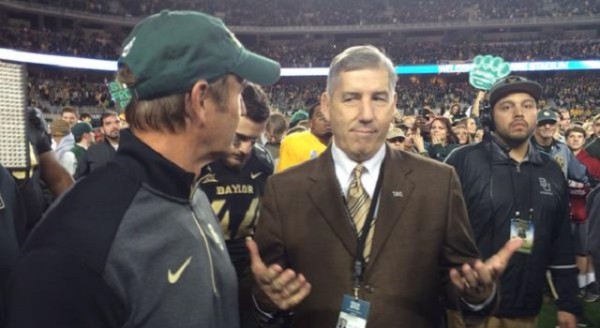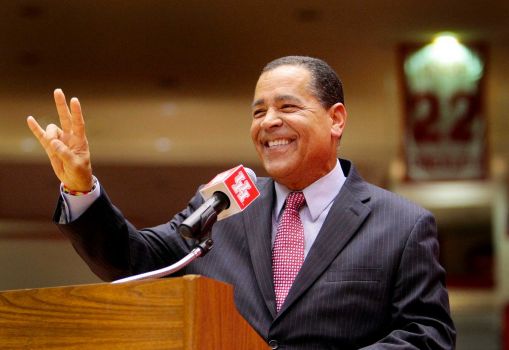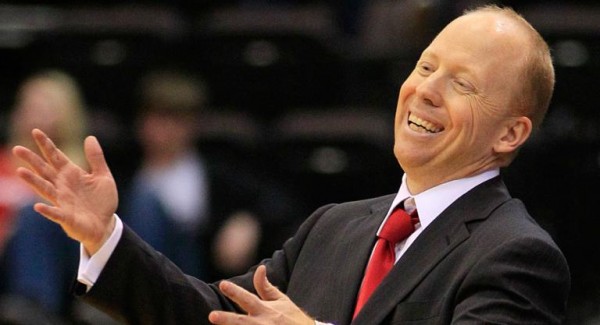Is the Big 12 Ready to Become the Big 12 Again? The Basketball Viewpoint
Posted by Nate Kotisso on December 8th, 2014With TCU and Baylor each ranked among the top six of the College Football Playoff’s rankings heading into Championship Weekend, it looked as if the Big 12 had two strong candidates to clinch a playoff spot. As luck would have it, selection committee things behind closed doors happened, and the conference as a result was shut out of the CFP in favor of Big Ten champion Ohio State. Committee chairman Jeff Long hinted on Sunday that the fact that Ohio State had played and convincingly won a conference championship game gave the Buckeyes a competitive advantage over the Horned Frogs and Bears, the Big 12’s co-champs (for those of you wondering, the 10-team Big 12 is not allowed to hold a championship game because of its conference size). In response to Long’s comments, Big 12 Commissioner Bob Bowlsby said, “It’s clear we were penalized for not having a championship game… That will cause us to go back to the drawing board a little bit.”

Big 12 Commissioner Bob Bowlsby to Baylor head football coach Art Briles: “¯\_(ツ)_/¯.” (Associated Press)
Going back to the drawing board could mean that the Big 12 may consider expanding back to 12 schools to satisfy NCAA bylaws dictating conferences must have at least 12 teams to hold a championship game. With football clearly the driver in such a determination, let’s take a look at which schools as additions would also add serious value to Big 12 basketball, because that’s the side any of us on this microsite really care about.
The Likeliest Candidates:
- Memphis: According to a report from ESPN Nashville radio host Darren McFarland, the Big 12 is interested in poaching Memphis and Cincinnati away from the American Athletic Conference in the upcoming offseason. We should probably take this claim with a tiny grain of salt. Had this rumor swirled around four years ago, most would have considered it to be more foolish than unrealistic, but now, given the state of conference realignment, there could be something to this. Although Memphis has been up and down in football, Memphis basketball history runs deep and their loyal fans fill up FedEx Forum with regularity. The city is also a hotbed for some of the best basketball talent in the country. A statement from one man, though, sticks out more than any other. Noted Oklahoma State enthusiast/booster T. Boone Pickens gave an interview to the Austin-American Statesman a few weeks ago and spoke on possible expansion: “Memphis wants in it [the Big 12],” Pickens said. “I was vocal back when we were expanding that we needed to take TCU, and Texas didn’t want TCU in. […] TCU deserves to be in the conference. It’s an old Southwest Conference school.” Could Pickens be the most powerful man in the Big 12? He wanted TCU in the Big 12, Texas didn’t want TCU, and here we are in present day with TCU in the Big 12. Who’s to say that he can’t make it happen for Memphis? Plus, it seems like Memphis and Oklahoma State are committed to playing in hoops annually anyway.
- Cincinnati: Bearcats fans are familiar with the will-they-or-won’t-they gossip about their school joining the Big 12, but with the other power football leagues seemingly done with expansion for the immediate future, this is likely their last shot at joining the big boy table for a while. Cincinnati has been a competitive football program for the better part of the last decade, and since taking over for the legendary Bob Huggins in 2006, Mick Cronin has rebuilt the basketball program in his own image of toughness and defense. The Cincinnati native has averaged approximately 25 wins per season since 2010-11, a span which includes four NCAA Tournament appearances, a Sweet Sixteen, and a conference regular season title. Perhaps Cincinnati anticipated a short stay in the American when it hired Mike Bohn as the athletic director back in February; Bohn was fired from the same position at Colorado where he helped guide the Buffs’ move from the Big 12 to the Pac-12. Adding Cincinnati to the Big 12 could alleviate some of the travel costs with West Virginia right next door, and like Memphis, the school is located in a metropolitan city with a big endowment (a shade over $1 billion), strong local alumni base and the opportunity to recruit the prospect-rich state of Ohio. The Big 12 needs two schools to get to a total of 12 and these two schools need the Big 12.
The Maybe Candidate: BYU: As the other big-named independent in college football, Brigham Young still commands quite a bit of national attention thanks to its long-term ESPN contract to air Cougars’ home games through 2018. On the basketball side of things, BYU has been just OK over the past few years. When Jimmermania crescendoed in Provo in 2010-11, BYU then played in the Mountain West with San Diego State and UNLV in a highly competitive basketball conference. Since then, the Cougars have set up their basketball wares in the WCC, perhaps better known as the league Gonzaga always wins. Dave Rose has done his best in to keep the program competitive outside of a major conference, but it is difficult when he has to overschedule in November and December to ensure those important opportunities to boost RPI, strength of schedule and NCAA Tournament seeding. Armed with their own billion-dollar endowment, BYU would not only restore a western presence for the Big 12 but would also give the league access to a wealthy worldwide alumni base that loves their school.
The Unlikeliest of Candidates:
- Houston: Houston is in a funky situation. There is a clear history between the school and current Big 12 schools Baylor, Texas, TCU and Texas Tech, dating back to their days in the now-defunct Southwest Conference. Like Memphis and Cincinnati, Houston also plays in the AAC and would love to join the higher-profile Big 12. Under Kelvin Sampson, who certainly knows his way around the league, the Cougars are hopeful that he can eventually restore the long dormant tradition of Houston basketball. As of now, the school has given some indication that it wants an attractive athletic program. It just completed construction on TDECU Stadium, which opened in time for the football team to take the field in August. Three months ago, it also announced it would begin construction on a $25 million practice facility for the men’s and women’s basketball programs, with an estimated completion date on that set for August 2015. That still leaves Hofheinz Pavilion — the school’s 45-year-old going on 60 basketball arena — that needs to be replaced at its existing site or moved to a different location on campus. A final decision has yet to be made on that issue, but funding may be harder to come by than originally thought. There is another hold-up here. While Cougars’ alumni have long pined for a spot in the Big 12, the other schools might not be all that interested in inviting along another Texas institution because the addition would amount to five Texas schools in the Big 12 footprint. But if you’re to believe T. Boone Pickens’ quote about bringing the old SWC members back together, it would be best to at least keep an eye on how everything shakes out.

If Houston were to join the Big 12, head coach Kelvin Sampson would know his way around the league. (Houston Chronicle)
- Boise State: You know the Broncos for their football but basketball is really just getting off the ground at Boise State. Leon Rice has helped the team become respectable with consecutive 20-win seasons, but the program is still far from a regional, much less national, draw in hoops. Boise State is always a hot name when expansion talk returns but their location in the Pacific Northwest creates significant travel issues for most league teams. Can you imagine West Virginia playing a Wednesday night game in Boise? Mountain West commissioner Craig Thompson has credited the school’s staying in the league for allowing the conference to get a more lucrative contract from ESPN, and over the first two years of the new TV deal, Boise State has earned $3.7 million in revenue (more than any other Mountain West school). Currently, the Broncos are the kings of their own castle in that league. While the difference in TV money would be huge, it might not be as worthwhile to the program to become a second-class citizen in a new league while it rules the roost in its current one.










































